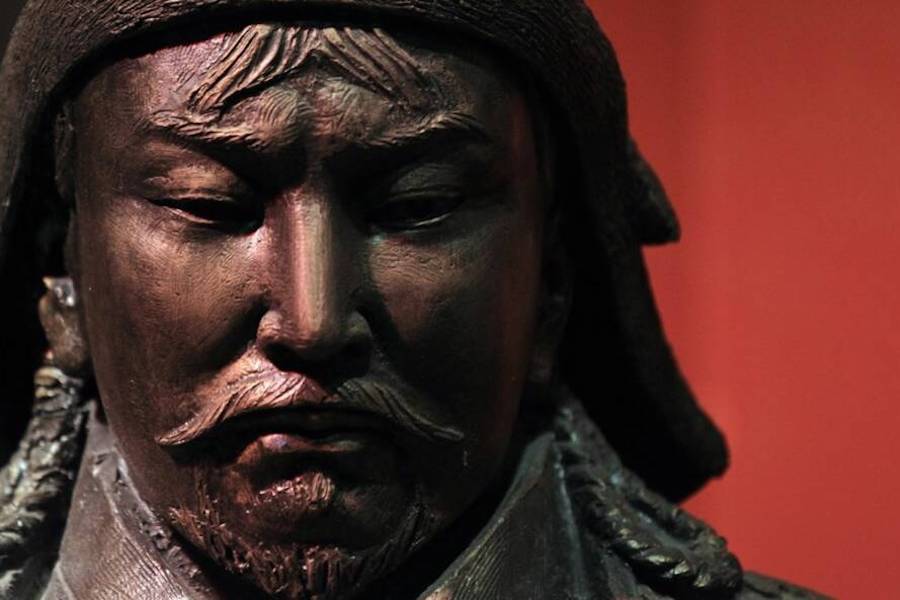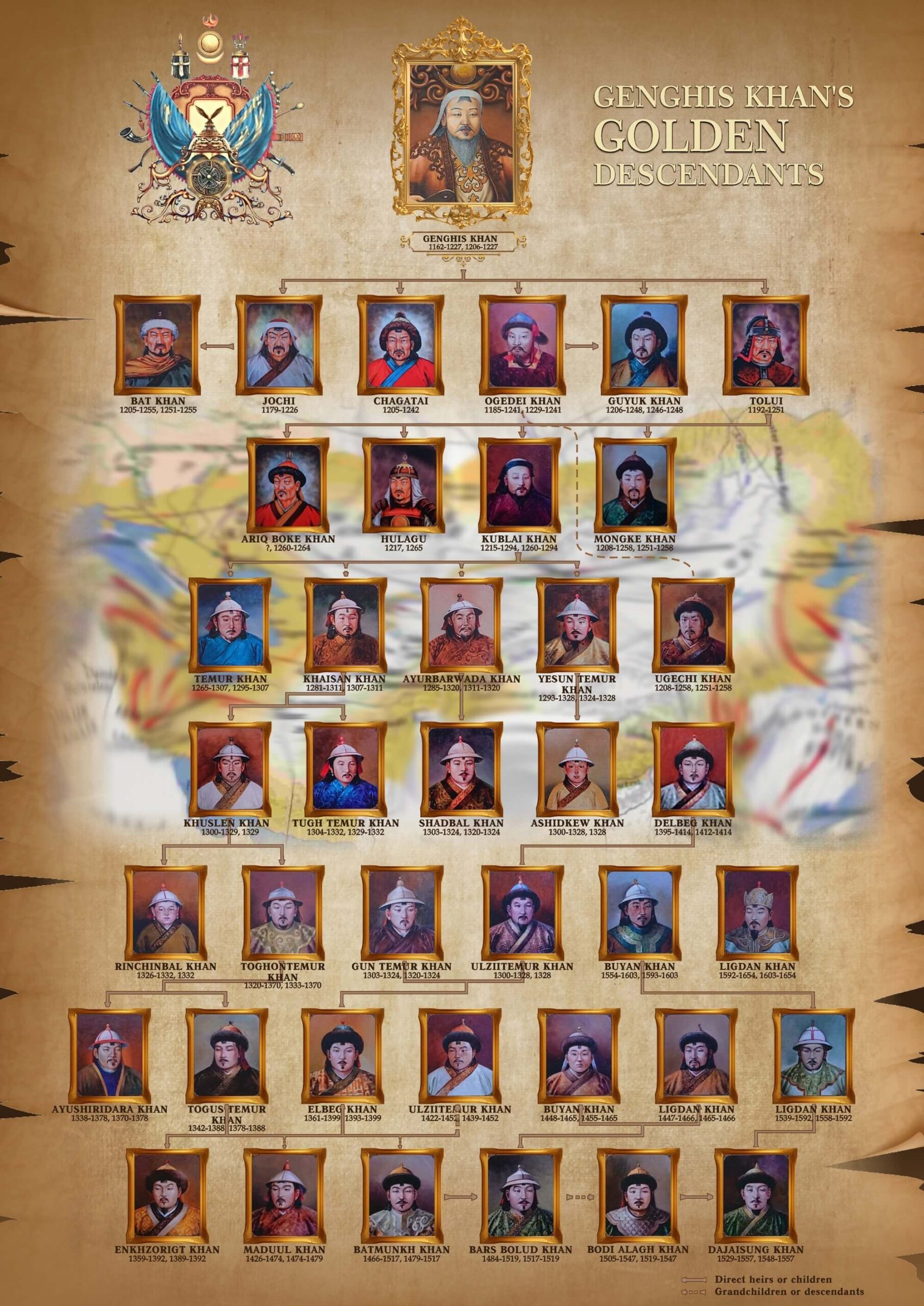When we talk about Genghis Khan, the first thing that comes to mind is his massive empire and his legendary conquests. But have you ever wondered about the children of Genghis Khan? They played a crucial role in shaping the Mongol Empire and its legacy. This article dives deep into the lives, contributions, and influence of Genghis Khan's offspring, revealing fascinating details about one of history's most powerful dynasties.
Genghis Khan wasn’t just a warrior; he was a family man who left behind a lineage that shaped the world. His children were not only heirs to his empire but also key players in maintaining and expanding it. From their roles in leadership to their personal lives, the story of Genghis Khan’s children is as captivating as the man himself.
As we explore this topic, we’ll uncover the names, achievements, and challenges faced by Genghis Khan’s children. You’ll discover how they contributed to one of the largest empires in history and how their descendants continue to impact our world today. So, let’s dive into the fascinating world of Genghis Khan children!
Read also:Joey King Instagram A Deep Dive Into The Stars Life Career And Influence
Who Was Genghis Khan?
Before we delve into the lives of Genghis Khan’s children, it’s essential to understand the man behind the legend. Genghis Khan, born as Temüjin, was the founder and first Great Khan of the Mongol Empire. He united the nomadic tribes of Northeast Asia and launched a series of military campaigns that resulted in the largest contiguous land empire in history.
His leadership style was both brutal and strategic. He was known for his military genius, but also for his administrative skills. Genghis Khan established a code of law, the Yassa, which governed his empire and promoted religious tolerance. His vision extended beyond conquest, and he laid the foundation for a legacy that his children would inherit and expand upon.
Biography of Genghis Khan
Temüjin was born around 1162 in the Mongolian steppes. His early life was marked by hardship and adversity. After his father’s death, his family was abandoned by their tribe, forcing them to survive in harsh conditions. Despite these challenges, Temüjin rose to power, eventually becoming Genghis Khan in 1206.
Here’s a quick overview of Genghis Khan’s life:
| Born | Around 1162 |
|---|---|
| Birth Name | Temüjin |
| Title | Genghis Khan (1206) |
| Death | 1227 |
| Spouse | Börte |
| Children | Jochi, Chagatai, Ögedei, Tolui, and more |
Genghis Khan Children: An Overview
So, who exactly were the children of Genghis Khan? The great Khan had numerous children, both legitimate and illegitimate, but four of his sons played the most significant roles in the Mongol Empire. These sons were Jochi, Chagatai, Ögedei, and Tolui. Each of them inherited different parts of the empire and contributed to its expansion and administration.
Here’s a quick rundown of Genghis Khan’s children:
Read also:Ben Affleck Smoking The Truth Behind The Headlines
- Jochi: The eldest son, who ruled the northern territories.
- Chagatai: The second son, who governed Central Asia.
- Ögedei: The third son, who became the Great Khan after Genghis Khan.
- Tolui: The youngest son, whose descendants included Kublai Khan.
The Role of Genghis Khan's Sons
Genghis Khan’s sons were more than just heirs; they were strategists, leaders, and conquerors in their own right. Each son was given a specific territory to govern, ensuring the stability and expansion of the empire. This division of power was a testament to Genghis Khan’s foresight and strategic thinking.
Let’s take a closer look at the roles of each son:
- Jochi: Ruled over the westernmost part of the empire, including modern-day Kazakhstan and parts of Russia.
- Chagatai: Governed Central Asia, including modern-day Uzbekistan and parts of Afghanistan.
- Ögedei: Became the second Great Khan, continuing his father’s legacy of conquest and administration.
- Tolui: Although he didn’t become the Great Khan, his descendants, including Kublai Khan, played crucial roles in the empire’s future.
Meet the Children of Genghis Khan
Jochi: The Eldest Son
Jochi, the eldest son of Genghis Khan, was a key figure in the early expansion of the Mongol Empire. He ruled over the western territories, which included modern-day Kazakhstan and parts of Russia. Jochi’s role was pivotal in securing the empire’s borders and ensuring its stability.
Despite his importance, Jochi’s relationship with his father was complex. There were rumors about his legitimacy, which created tension within the family. Nevertheless, Jochi’s descendants continued to play significant roles in the empire’s history.
Chagatai: The Second Son
Chagatai, the second son of Genghis Khan, governed Central Asia. Known for his strict adherence to his father’s laws, Chagatai was a formidable leader who maintained order in his domain. His region became known as the Chagatai Khanate, which played a crucial role in the empire’s administration.
Chagatai was also instrumental in upholding the Yassa, the legal code established by Genghis Khan. His commitment to his father’s vision ensured the continuity of the empire’s values and principles.
Ögedei: The Third Son
Ögedei, the third son of Genghis Khan, became the second Great Khan after his father’s death. He continued the expansion of the empire, conquering new territories and establishing alliances. Ögedei was known for his diplomatic skills and his ability to unite the various factions within the empire.
Under Ögedei’s rule, the Mongol Empire reached its zenith. He expanded trade routes, improved infrastructure, and promoted cultural exchanges. His reign was marked by both military success and administrative innovation.
Tolui: The Youngest Son
Tolui, the youngest son of Genghis Khan, may not have become the Great Khan, but his descendants played crucial roles in the empire’s future. Among his offspring were Kublai Khan, who founded the Yuan Dynasty in China, and Hulagu Khan, who conquered parts of the Middle East.
Tolui’s lineage ensured that the legacy of Genghis Khan continued long after his death. His descendants expanded the empire’s influence and left a lasting impact on world history.
The Legacy of Genghis Khan Children
The children of Genghis Khan didn’t just inherit an empire; they built upon it. Their contributions to the Mongol Empire’s expansion and administration were instrumental in its success. From Jochi’s western campaigns to Tolui’s descendants’ conquests, the legacy of Genghis Khan’s children is undeniable.
Here are some key points about their legacy:
- Expansion: The sons of Genghis Khan continued to expand the empire, conquering new territories and establishing trade routes.
- Administration: They implemented their father’s vision of governance, promoting religious tolerance and legal reform.
- Cultural Impact: The descendants of Genghis Khan, particularly those of Tolui, left a lasting impact on the cultures they encountered.
Impact on World History
The influence of Genghis Khan’s children extends beyond the Mongol Empire. Their descendants played key roles in shaping the history of Asia, Europe, and the Middle East. From Kublai Khan’s rule in China to Hulagu Khan’s conquests in the Middle East, the legacy of Genghis Khan’s children is felt to this day.
Here are some examples of their impact:
- Kublai Khan: Founded the Yuan Dynasty in China, promoting cultural exchange and economic growth.
- Hulagu Khan: Conquered parts of the Middle East, including Baghdad, and established the Ilkhanate.
Genghis Khan Children and Modern DNA Studies
Modern science has shed new light on the descendants of Genghis Khan. DNA studies have revealed that a significant portion of the world’s population carries the genetic markers of Genghis Khan’s lineage. This suggests that his children and descendants were incredibly successful in spreading their genes across the globe.
Here are some fascinating findings:
- A study published in the American Journal of Human Genetics found that about 8% of men in the regions once controlled by the Mongol Empire carry Y-chromosomes linked to Genghis Khan.
- This genetic legacy highlights the impact of Genghis Khan’s children on world populations.
Genetic Legacy Today
The genetic legacy of Genghis Khan’s children is a testament to their historical significance. It also raises interesting questions about the impact of historical figures on modern populations. As we continue to study DNA, we gain a deeper understanding of how the past shapes the present.
Challenges Faced by Genghis Khan's Children
Despite their successes, the children of Genghis Khan faced numerous challenges. From internal conflicts to external threats, they had to navigate a complex political landscape to maintain the empire’s stability. Here are some of the challenges they encountered:
- Succession Disputes: The question of who would succeed Genghis Khan as the Great Khan led to tensions within the family.
- External Threats: The empire faced resistance from various factions, including the Jin Dynasty in China and the Khwarezmian Empire.
- Administrative Challenges: Governing such a vast empire required innovative solutions and strong leadership.
How They Overcame These Challenges
The children of Genghis Khan overcame these challenges through a combination of military prowess, diplomatic skills, and administrative innovation. They built upon their father’s legacy, adapting to changing circumstances and ensuring the empire’s survival.
Conclusion: The Enduring Legacy of Genghis Khan Children
The children of Genghis Khan played a crucial role in shaping the Mongol Empire and its legacy. From their military conquests to their administrative innovations, they left an indelible mark on world history. Their descendants continued to influence global events, leaving a legacy that endures to this day.
So, what can we learn from the story of Genghis Khan’s children? First, the importance of family in shaping history cannot be overstated. Second, the impact of historical figures extends far beyond their lifetimes, influencing generations to come.
Call to Action: If you found this article informative, feel free to leave a comment or share it with your friends. And if you’re interested in learning more about world history, check out our other articles on historical figures and events.
Table of Contents


